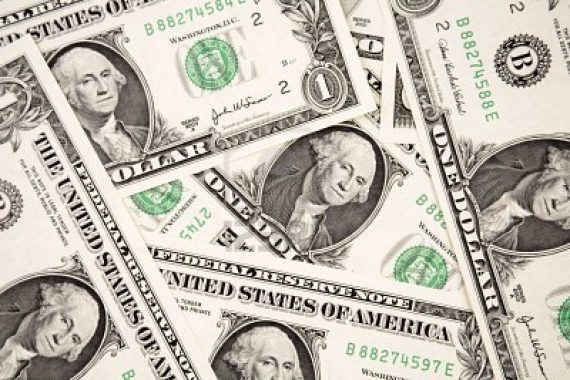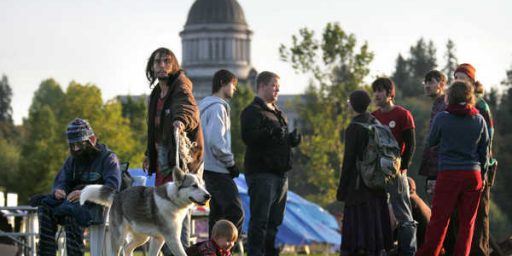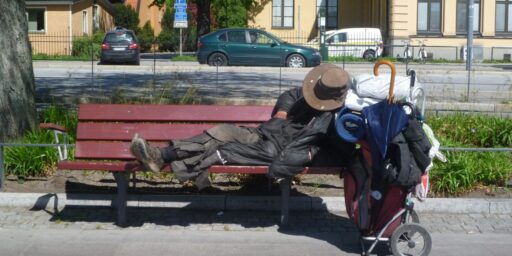What’s So Great About A “Cashless Economy?”
Electronic payments are convenient but sometimes there's nothing better than money in your pocket.
Megan McArdle explores how the rise of electronic payment systems could end up hurting the lowest end of society:
My neighborhood is a focal point for homeless-services organizations, which means that on any fine day, there will be homeless people sitting on the grassy areas. None of them are panhandlers. But yesterday, as I passed a group of homeless people, I realized that I wouldn’t be able to give them money even if they asked for it, because I didn’t have any cash. I almost never have any cash anymore. It used to be necessary for food trucks and taxis and so forth, but now they all take credit cards. Now we mostly just need cash to tip the occasional delivery person, and I leave that cash at home, in my husband’s wallet.
Which makes me wonder what Square Inc., and the rise of similar digital-payment systems, means for panhandling and busking. In some ways, digital payments have made it easier to help people in need — my Facebook feed is filled with appeals to bring meals to new mothers and people with illness in the family, donate to people who have fallen on financial difficulties, and fund various sorts of projects, and often I do help. But panhandlers rely on casual charity. Sure, there are people who organize what they give: McDonald’s gift certificates, or a certain amount to each person. There are also those who don’t give anything, instead donating to groups such as So Others Might Eat.
But most of us, whether we give to homeless-oriented charities or not, are not so organized. We sometimes give whatever small bills or change we happen to have in our pockets; if we don’t have money, we don’t give.
More and more people are like me, however: They don’t have it in their pockets in the first place. In theory, they might transfer the money they aren’t giving out to a charity instead, but I doubt it. Most people probably have the money they give to panhandlers in a completely different mental basket from their tax-deductible charitable donations; they won’t amp up the one just because they’ve stopped the other entirely.
Reality, of course, is that many street panhandlers end up spending whatever cash they get in less than ideal ways such as buying alcohol or illegal drugs. Nonetheless, McArdle raises a point about electronic payments and the decline in the use of cash that go far beyond how it might impact the homeless. There are any number of small transactions that people engage in on a regular basis that involve the use of small amounts of cash or change. Whether it’s buying Girl Scout cookies or throwing loose change into the Salvation Army kettle during the holidays, there are numerous things we do on a daily basis that would be a lot more difficult, or at least more expensive or one or both parties, if electronic payments were the primary medium of change. Some areas of the economy will be able to adapt to electronic payments, of course, but others will find it far more difficult, and it will be doubly difficult for individuals on the lower end of the economic spectrum who don’t have bank accounts and rely on cash and money orders to pay their bills. How they’ll manage in a world of electronic payments is a question that nobody has found a good answer to yet.
There are other advantages to cash that don’t translate well to the electronic world, of course For one thing, you can still use cash when the power goes out or access to the Internet is down or unavailable. For another, cash payments provide a level of anonymity that is sorely missing in our increasingly interconnected world. There’s something to be said for that kind of world, and that anonymity may end up being the reason why whenever really find ourselves in a “cashless economy,” at least not anytime in the near future.






Many years ago American Express ran ads exhorting us, “don’t carry cash!” Well, I took their advice – I rarely have more than $20 to $40 in my wallet. I transact so many purchases with my debit card that I often forget to hit the ATM for a refill. My daughters are the same way, and my wife constantly nags all of us to carry more cash than we do.
I’m not too worried, cash will never become irrelevant.
The last time the Girl Scouts were selling cookies on my college campus, one of the moms had a widget to take credit card payments via her phone.
@al-Ameda:
Tell me about it. I almost never carry any cash with me, not even a single dollar. It just never occurs to me. My son’s pre-school has pizza on Fridays, and when I had to drop him off a couple weeks ago, I didn’t have the dollar to give him for pizza. I had to run back out to my car and hunt for quarters in my center console, just so he wouldn’t be the only kid in class who couldn’t have pizza. Being cashless is nice for most things, but carrying a tiny bit of cash is still something I need to remind myself to do.
About the only thing I still pay cash for are Taxi rides simply because I don’t trust the drivers. My bills are all automatically withdrawn from my checking account. I do use a re loadable American Express card for online purchases so there is a limit as to how badly I can be burned if the account information is compromised.
Zero cash in my pocket right now. I think the last time I had last paper money on me was this past Saturday…so 4 days ago. I do keep cash stashed around my house in preparation for the zombie apocalypse. Water and batteries too.
I generally carry hundreds of dollars in my pocket at any one time. First, because a lot of bars and restaurants in NYC are still cash only, second, because I like to be prepared for emergencies, and third, because I don’t necessarily want my banks and future litigants to track exactly how much alcohol, condoms, sex toys and other items I buy in a month….
People have been talking about the digital divide for quite a number of year now. This is just one aspect of it. Telecommunications is another. How many pay phones do you see now? Almost none.
I happen to be one of the organized ones; I keep a couple of supermarket gift cards to hand out.
Are there any citations for this? Have any studies been made, or do you just sort of know this “because?”
If you don’t want them buying illegal drugs or (legal) alcohol, are there legal drugs you do approve of their buying? And why shouldn’t they buy legal products?
I never give the panhandlers cash. I will offer a hamburger or cup of coffee from the nearest fast food place, but they rarely take it and most act they are insulted. Giving them money is never a wise idea. I also try to direct them to the nearest Salvation Army center or a church that gives out food. Even then I have sometimes been cursed out, and viciously at that.
I always have some folding money on me. Businesses are charged for most, if not all, electronic transactions and sometimes my purchase is under a few dollars.
And yes, every electronic purchase one makes is recorded.
COURTROOM SCENE
PROSECUTOR: Isn’t it a fact that on 8 January 2005, you willingly purchased twelve bottles of . . . Zima?
DEFENDANT: (sobs)
@Woody: I never thought about that, and that would really have been a big problem in NYC when Bloomberg was mayor. He could keep track of large soft drink purchases that people made at fast food places. Man, a lot of people would be in big trouble.Next would be arrests for possession of – donuts !! And I don’t know about that new mayor up there. From what I hear he might be even worse, if that is possible.
“Let the good times roll”
@M. Bouffant:
Indeed. One of the few things I remember from my undergraduate Intermediate Microeconomics course was the professor’s response to the “But won’t they just buy liquor with it?” reaction to cash subsidies:
“Probably. But then, so would I, in that situation.”
You can’t even get a Social Security check anymore although they will set you up with a debit card that doesn’t require a photo ID. But the fact remains if you don’t have a photo ID you are marginalized and it’s not just voting. You can’t open a bank account, fly or take Amtrak. If we have decided we need a “your papers please” society it should be cheap and easy to get those papers. Of course when I was growing up in the 50s “your papers please” was used to scare us about Communism.
@Tyrell:
Well, buddy, I’ve panhandled some in my time. I don’t know that I’d curse you to your face for you behaviior — but I’d certaintly flip you the bird when you were walking away. In fact, I’d likely do so today.
Look — panhandling is the guy’s JOB. He goes to a store or street corner, hits folks for their loose changhe, and after a while counts his take and starts calculating whether he’s made enough to gp into that supermarket and buy some lunch meat and bread and maybe a pack of cigarettes and get through the evening in reasonable comfort. He;s trying to make some sort of living, in other words, and you are not helping. Dropping him off at a Macdonalds with a couple of bucks isn’t help either, unless maybe it’s on the way to where he’s camped out — he’s trying to plan for a future, and you don’t see it because you’re a pretentious jerk using your God given knowledge of all humanity to classify him as an untermensch.
I still carry cash because the poker night I go to with a bunch of friends doesn’t take credit or debit.
@mike shupp: I have to run the gamut of panhandlers too often every day to have any sympathy for them. Ever heard the statement “beggars can’t be choosers?”
And panhandling is NOT a job. It’s just being a damned nuisance to people who are walking through a public space. I now don’t believe any of the fairy stories you tell me about having lost your job, just-need-enough-cash-to-get-home, oops-I-lost-my-wallet, or give-me-money-in-Jesus’s name. Just shut up and get out of my way, ok?
I’m grumpy enough to wish that all beggars be whisked away and forced to work in the fields detasselling corn for 90 days before being let out in public again.
@grumpy realist:
Actually the line I used was “Spare some change?” If that offends you, TS.
@mike shupp: And my response is: “get a job.” (only said to the really aggressive panhandlers who try to stand in my way or block my entrance into the train station.)
I don’t think you realize how absolutely aggravating it is to get accosted every bloody block on my walk in to work by someone whining for money, day in, day out, 5 days a week, 52 weeks a year. It’s gotten to the point where I don’t even listen when someone tries to stop me on the sidewalks, because 99.9% of the time it’s some panhandler trying to tug at the heartstrings with a hard-luck story. Whine whine whine. So for those of you near Union Station trying to figure out which direction Ogilvie Station is, sorry. I’m not going to take the chance. And I have to run this gauntlet every damn day.
I used to feel sorry for panhandlers and would give out some money, but no more. Too much, too often, and too many times.
When living in NYC, I finally resorted to handing out bagels instead of cash. There was a good percentage of aggressive beggars (particularly on the subways, looking for tourists) and cheats (the guy on the upper west side who faked cerebral palsy particularly rankled), but only about 20% of the time would people refuse food. Even the guys I knew (because I asked and they told me) used cash to buy crack (and later meth) almost always accepted food graciously.
I’m reminded of the Italians ending low-denomination lire notes back in the day. People started using matchbooks and candy to make change, and I wondered if that was barter or currency.